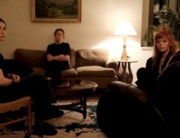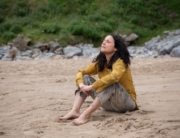When Sascha (Victoria Carmen Sonne) arrives on the Turkish Riviera to spend days at the sunny villa with her middle-age drug lord boyfriend, she has an idea of what she’s getting into. Before meeting with Michael (Lai Yde), she has already been slapped by one of the gangster’s minions for taking some money, and she learns that she is not more than an ideal trophy woman valued for her youth and beauty. In this unequal relationship, she has to have good reasons to stay, right? During a visit to a jewelry store, Michael proposes to buy anything of her choice. She likes the emerald earrings, and he admires her excellent taste, saying emeralds are more expensive than diamonds. Can only this type of man please her in the way she wants?
Holiday marks the feature film debut of director Isabella Eklöf. Her title underlines an ironic comment about a setting that looks like a summer postcard with pools, mansions, yachts, and neon lit nightclubs. This could be the perfect setting to fall in love and have an unforgettable affair. However, the film includes graphic sexual violence that breaks the idyllic environment captured by the exuberant cinematography.
Besides Michael, another man is attracted to Sascha and her particular tastes. She meets Tomas (Thijs Römer), a handsome, young Dutch tourist in an ice-cream shop, and he tries to guess her favorite flavor after claiming she doesn’t look like a vanilla girl. He guesses halfway with strawberry. Strawberry with champagne is the right answer. (Romantic enough?) They later share a proper first date on a beach where she invites him to get high on Ecstasy.
As you can expect, this is not exactly a love story—and not just because of Michael, the dangerous part of this love triangle. Sascha is an unfathomable character, and it’s hard to predict her thoughts and actions. An intimate moment occurs in the nightclub when she stares at her reflection in a mirror for a long time. There’s nothing revealing about who she is and how she ends in an abusive relationship with a powerful man, but that scene expresses her deep isolation. Neither jewels nor romance will disturb that emptiness. Maybe she can’t be the heroine of her own story, but it would be reductive to claim that she is only a victim.
A woman like Sascha is more than an object of desire. She is a fetishized and purchased possession in the hands of a man who has the power to do whatever he wants with her body. Another outcome with a supposedly good man like Tomas is not really an option in this movie. Intentionally, there is nothing pleasant in this story, despite the attractive and even sometimes sexy images.
What is not sexy is that every time Michael exerts his will over Sascha, he uses sex as a tool of domination. In an upsetting scene, the drug dealer plays with the body of the passed-out Sascha, twisting her arms and spreading her legs as though she were a doll. The worst comes later. The centerpiece of the movie is a shocking and ugly rape scene. As in most of the movie, the camera sits statically at a prudent distance, but nothing remains unseen. It’s an explicitly pornographic, humiliating, and long enough scene to make viewers feel upset and anxious.
But I’m not sure you can call it gratuitous because it serves perfectly the director’s vision. Sascha is not the virginal Justine of a Sade novel, but in the eyes of Eklöf, she is a body to be cruelly mistreated in order to prove the death of any virtue as well as the capitalistic dynamics that enable men to buy women and kill their souls. You may disagree with the filmmaker’s extreme artistic decisions, but they were made to provoke instant revulsion. This is a talented director who has made a remarkable and disturbing first impression. However, this is not a movie you want to watch twice, though you will not soon forget it.







Leave A Comment